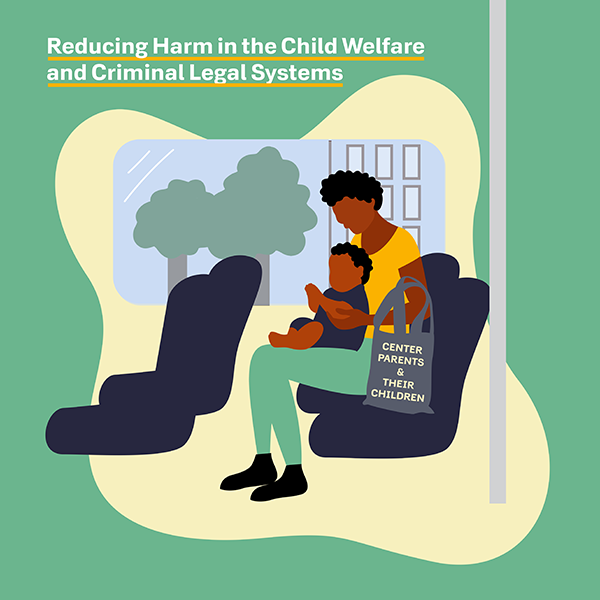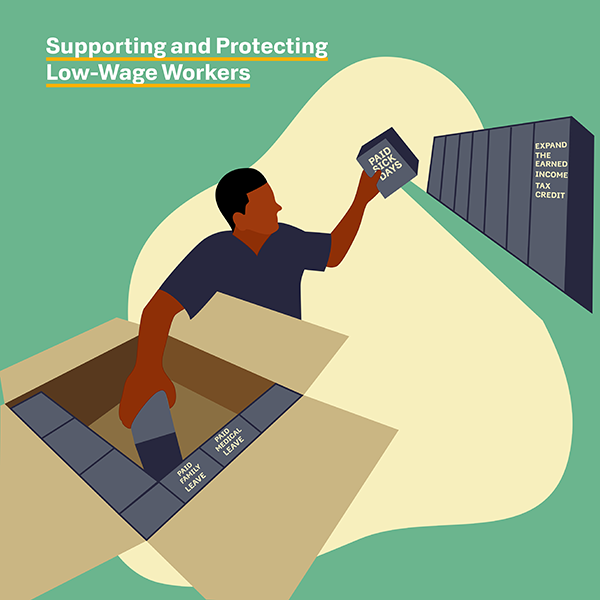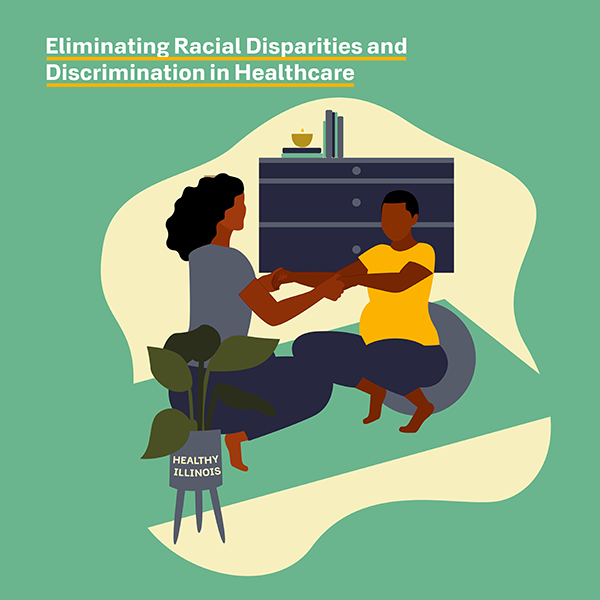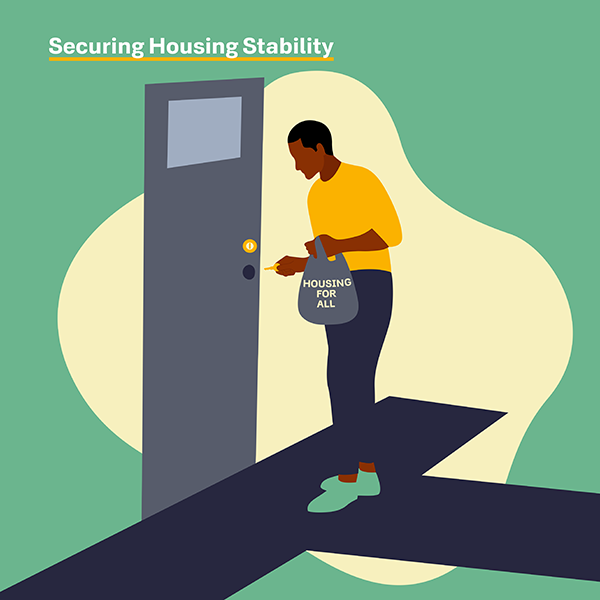The Shriver Center on Poverty Law champions these policies in this 2021 legislative session.
February 16, 2021
As Illinois works to build back our state from the COVID-19 pandemic, we must lead with equity. Last year’s racial reckoning laid bare structural, race, and gender inequities inherent in our criminal legal system, economy, healthcare, and housing.
After historic progress in the Lame-Duck Session, the moment is now to ensure immediate and long-term reforms. The Shriver Center on Poverty Law champions these policies in this 2021 legislative session.

HB3821 – Racial Disproportionality in Child Welfare Task Force (Rep. Harper / Sen. Hunter) – Black children and Black parents and caregivers (women in particular) are disproportionately represented in the child welfare system. Black children and youth are represented in the child welfare system in Illinois at approximately three times the percentage of the statewide child population that is Black. This bill creates a task force to examine the racial disparities of children and families involved in the child welfare system, examine the long-term impacts of involvement, understand the causes for involvement, identify needs and resources for families, and identify funding for preventative services and alternatives to foster care.

HB 2792 / SB 2184 – Expand the Earned Income Tax Credit (EITC) (Sen. Sims / Rep. Ammons) – Black and Latino/a/x Illinoisans are overrepresented in low wage occupations, yet currently only 14% of all dollars spent on Illinois’ earned income tax credit go to Black filers, and 10% go to Latino/a/x filers. This bill would build on the success of the current program and advance racial equity by expanding eligibility to 18-24-year-old childless adults, adults over 65, caregivers with dependents, and all immigrants who file taxes using an Individual Taxpayer Identification Number, providing a tax cut for many low wage Black and Latino/a/x workers in Illinois.
HB 3898 – Healthy Workplace Act (Rep. Gordon-Booth / Sen. Lightford) – The pandemic highlights the need for a solution for all workers, including essential workers, to have at least a minimal amount of sick leave to use without fear of a loss of income or their jobs. About 1.5 million workers in Illinois do not have access to even a single paid sick day. Over three-fourths of low-wage workers do not have paid sick leave; Black, Latino/a/x people and women are overrepresented among low-wage workers relative to their share of the total number in the workforce. Too many low-wage workers go to work sick because they cannot afford to take unpaid leave, and fear losing their job if they do.
SB 835 – Family and Medical Leave Insurance Act (Sen. Villivalam) – High wage workers have greater access to paid leave than middle- and lower-wage workers. Only 13 percent of workers have access to paid maternity leave; and only 9 percent have access to paid paternity leave. This legislation would create a state-operated program to provide all workers with paid, job-guaranteed leave. Reasons for leave include a worker’s own illness, to care for an ill family member, domestic or sexual violence, pregnancy, birth, to care for a new child in the household, a need arising out of an active-duty family member in the armed forces, and for COVID-19. Nine states and the District of Columbia have enacted paid family and medical leave laws.

SIGNED– HB 158 / HB 159 – Healthcare Omnibus (Rep. Lilly / Sen. Hunter) – Contains innovative provisions that will eliminate biases and injustices in Illinois’ healthcare system including: (1) creating a Community Health Worker Certification which will train those that have a connection to the community in which they serve; (2) creating an Anti-Racism Commission that will identify and propose statewide policies to eliminate systemic racism and advance equitable solutions; (3) allowing Medicaid reimbursement for Doulas, non-medical professionals who can help reduce the impacts of racism and racial bias in health care settings by providing individually tailored and client centered care and advocacy for pregnant and postpartum people; and (4) requiring implicit bias training for medical professionals. In addition to inclusion in the Healthcare Omnibus, Doula Medicaid Coverage HB 354 and Implicit Bias Training HB 309 have been introduced as standalone bills by Rep. Greenwood.
HB 146 / SB 1590 – Rate Review (Sen. Fine / Rep. Morgan) – Insurance premiums in Illinois can increase every year arbitrarily without explanation to consumers. Consumers are expected to pay the increases with no recourse. This bill empowers the Illinois Department of Insurance (DOI) to reject unreasonable, inadequate, or discriminatory health insurance rates through a rate review practice called “prior approval.” Rate review will help bring Illinois consumers protection, predictability, and stability when it comes to their healthcare.
HB 3493 – Healthy Illinois (Rep. Ramirez / Sen. Aquino) – Extends Medicaid look-alike program eligibility to low-income Illinois residents aged 19-64 with household incomes up to 138% FPL, regardless of immigration status. COVID-19 lays bare historic racial, ethnic, and income inequities in access to health care. Undocumented immigrants—millions of whom are serving on the frontlines as “essential workers”—face incredible barriers to health care, from uncertain coverage of testing and treatment to fear of immigration consequences. We cannot continue to accept health care disparities as normal and inevitable.

SIGNED – HB 2877 / SB 668 – COVID-19 Emergency Housing Act (Rep. Ramirez / Sen. Aquino) – COVID-19 has caused unprecedented economic instability for renters, homeowners, and landlords across the state. This bill addresses the housing crisis caused by the pandemic. The bill protects tenants from the long-term consequences of eviction records, codifies certain provisions of the federally funded emergency rental assistance program that will be administered by Illinois during 2021, prohibits tenant screening companies from disseminating a sealed eviction court record and creates penalties for doing so, and temporarily halts foreclosure proceedings for homeowners and small landlords. In these uncertain times, no one should fear losing their home.
HB 3913 – Ending Housing Banishment (Rep. Lilly) – The State of Illinois imposes draconian residency restrictions for people on public conviction registries so that it is impossible for many people to find a place to live outside of a rural setting. These policies cause chronic homelessness, especially among Black men, have no benefits for public safety and likely work to its detriment. This bill reduces residency restrictions by reducing the restricted zones by half, allows certain residents to stay in their existing stable housing, and eases the weekly registration requirements placed on people experiencing homelessness.
The Shriver Center is advocating on all fronts for systemic change. Sign our petition to support economic and racial justice in the face of COVID-19!
Contact Rudi Hancock, our Government Relations Liaison, for more information. Click here to view our full agenda.
We center parents in advocating for policies and laws that strengthen families.
Our laws and policies must support people by ensuring fair work at a living wage and by providing the income supports families need to be successful.
We are intentional about addressing barriers to healthcare that specific communities experience.
Shelter is not only a basic human need, it is also critical to people’s ability to pursue and attain economic stability.